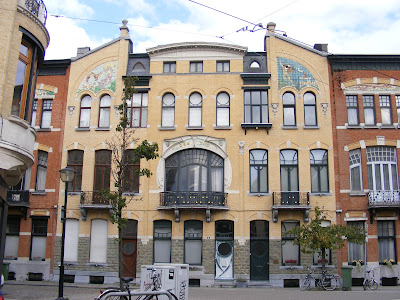That's always the way I am, though.

For some reason, I cannot get motivated to read about a place before I visit.

I always feel inundated with the information presented in tourist books.

I can't possibly remember it all in advance of what I end up seeing.
However, once I've been, I'm hungry to know more.

I prefer to do things this way, backwards as it is.

It's probably simply laziness on my part.
 |
| Bill remarked about how the lines of the car seemed capatible with those of the house. |

This works better on trains than when driving a motorhome, obviously.

Then again, there is a lot of time sitting around in a motorhome.
 |
| There are streets and streets of these things! |
I remember once that Frugal Scholar remarked she felt she hadn't done Britain properly on her previous visit, hadn't seen nearly all there was to see.
I've thought long and often about how to 'do' a country - even one as small as Britain - but I don't actually think it is possible.
Particularly when there is such a density of practically any object of interest, and such a length of history as Britain has.
But never mind Britain, we are 'doing' Belgium, right? Though Belgium has much the same length of history and is even smaller.
I think Bill did a brilliant job of selecting the focus we would most enjoy - that of tracking down art nouveau architecture. A round of applause for Bill, please

So here is another tangent for you. When Bill goes for a run, he prefers a circular route rather than an out-and-back.
I lean towards that latter approach for several reasons I won't list here. I always say the return view is different because one is facing a different way.

Here I have a case in point. I never realised there were not just two, but four houses at this corner.

They are called the Four Seasons. I'd only noticed the two green houses facing us, herfsz (autumn) and zomer. The two other corners are of course lente (spring) and winter.
Also, being taken with the funny bay windows and the shape of the roof lines, I missed the frescoes on each building, symbolizing each season.

Of course this area is not called South Africa by Antwerpians, but rather Zurenborg.

It is noted not just for the Art Nouveau architecture but for a wide variety of dramatic fin de siecle - turn of the (last) century - styles.

At some point in the notorious 1960s (when loads of historical buildings in Newcastle were demolished), this district was due to be re-developed.
It seems that because the interiors of the buildings were plain and old-fashioned, instead of being decorated throughout like Horta's house in Brussels, they were disdained.
Mind, plain and old-fashioned in the Victorian era will still likely mean high ceilings, wood floors and fireplaces.
 |
| I wanted to photograph them all, better yet, tour them all! |
I guess that's all common as muck in Europe but those features are still pretty exciting to me.

Thankfully some artistic types adopted these buildings and they became listed and most were saved from the wrecking ball.















1 comment:
Wow...I did love these pictures...you are so good at this.
Sandra
Post a Comment